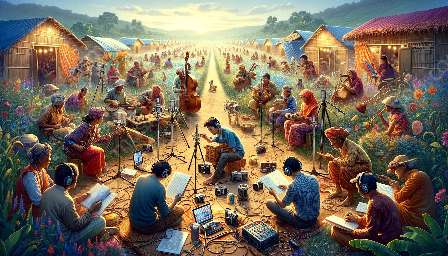Understanding and preserving diverse musical traditions is a pivotal aspect of ethnomusicology. Emerging technologies and digital humanities are revolutionizing the way scholars transcribe and analyze musical compositions from various cultural contexts. This topic cluster delves into the intersection of digital humanities and ethnomusicological transcription and analysis, providing a comprehensive exploration of the impact of technology on the study of music and culture.
Digital Humanities in Ethnomusicology
Digital humanities in ethnomusicology involve the application of computational tools and methodologies to study music within its cultural and social contexts. Technology facilitates the transcription, preservation, and analysis of musical traditions, offering innovative ways to document and understand diverse musical forms.
Ethnomusicological Transcription and Analysis
Transcription and analysis play a crucial role in ethnomusicology. Ethnomusicologists transcribe music from oral traditions and analyze its structure, function, and cultural significance. These processes are essential for preserving musical legacies and understanding the intricate relationships between music and society.
Impact of Technology
Advancements in digital tools and platforms have significantly transformed the field of ethnomusicology. Digital archives and repositories provide access to a vast collection of musical recordings, enabling researchers to transcribe and analyze music from various global communities. Moreover, computational analysis tools offer new perspectives on musical structures and performance practices, enriching our understanding of diverse musical traditions.
Challenges and Opportunities
While digital humanities offer numerous benefits to ethnomusicological transcription and analysis, they also present challenges. Issues such as copyright, cultural representation, and ethical considerations arise when utilizing digital technologies in the study of music and culture. However, these challenges also open opportunities for interdisciplinary collaborations and critical discussions, fostering a more inclusive and ethical approach to ethnomusicological research.
Future Directions
The future of digital humanities in ethnomusicology holds immense potential. As technology continues to evolve, scholars can leverage advanced computational methods for intricate musical analysis, develop interactive multimedia resources for education and outreach, and create comprehensive digital archives that preserve and promote diverse musical traditions.
Conclusion
The convergence of digital humanities and ethnomusicological transcription and analysis represents a dynamic and transformative field within the study of music and culture. By embracing technological innovations and addressing ethical considerations, scholars are poised to deepen their understanding of music as a reflection of human experience and enhance the preservation and dissemination of musical knowledge across global communities.



































